- Home
- Fergus Hume
The Millionaire Mystery Page 13
The Millionaire Mystery Read online
Page 13
‘And I am my own mistress, and I refuse,’ she said quietly. ‘You can’t frighten me. I don’t believe your stories.’
‘Nor do I,’ said the Rector. ‘When Mr Thorold comes back, he will, no doubt, be able to explain his presence in Heathton on that night, and also the loss of his lancet.’
‘He shall explain it to the police!’ cried Lestrange, in a threatening manner.
‘No, no,’ said Cicero, apprehensive at this mention of his natural enemies; ‘let us take counsel together. Cannot this matter be adjusted, so that Mr Thorold may escape the reward of his iniquitous proceedings?’
Sophy looked at him with a satirical smile. Then she turned to address Lestrange as the senior partner in this firm of scoundrels.
‘How much do you want?’ she asked.
The Captain winced. He did not like the question to be put quite so crudely.
‘I do not understand,’ he said.
‘I think you do. How much do you require to hold your tongue?’
‘Say five thousand,’ whispered Mr Gramp.
But Lestrange shook him off, and marched to the door very upright and indignant.
‘I will let you know my price—’
‘Ah!’ said Sophy scornfully.
‘When I have seen the police,’ finished he, and marched out.
Cicero had to follow, but he turned at the door and winked.
‘He will not go to the police,’ said he, in a hurried voice. ‘Might I suggest five—’
‘Be off, you scoundrel!’ cried the Rector indignantly, and thrust him out.
Then he resumed his seat, and looked at Sophy.
‘Well?’ said he.
‘Alan can explain,’ said she decisively.
‘But if Lestrange goes to the police?’
‘He won’t,’ she said. ‘Cicero will stop that. Meanwhile I wait for Alan.’
They talked on for a long time, but could come to no conclusion. Undoubtedly Alan had been near the vault on that night, had been in the hut, and had said nothing of these things to anyone. It certainly looked suspicious, but Sophy insisted that her lover could and would explain. In spite of appearances, she had faith in Alan’s honesty and in Alan’s honour.
That same evening she dined with the Rector, without even Miss Vicky in attendance.
Towards the end of the meal, Alan walked in unexpectedly. He looked somewhat downcast, but there was no sign of fear in his bearing. After greetings had been exchanged he sat down with them. Neither the Rector nor Sophy was anxious to inform him of the accusation which had been brought against him.
‘How went the business?’ asked Mr Phelps.
‘Badly—for us,’ was the reply. ‘Lestrange certainly arrived by the boat he said he came by. I saw his name, Achille Lestrange, on the passenger-list of the Negress.’
‘Ah! the devil speaks true sometimes!’ said the Rector. ‘And what about Beauchamp?’
‘Yes, yes!’ cried Sophy. ‘Did you find him? Did you see him?’
‘No,’ replied Alan quietly, ‘but I heard of him. Beauchamp is dead!’
CHAPTER XVI
ALAN’S DEFENCE
‘DEAD!’ repeated Sophy, after a pause. ‘Then was this Mr Beauchamp really my father or a relative?’
‘I think he was Mr Marlow, dear,’ said her lover gravely. ‘No doubt your father intended to feign death to escape Lestrange, but it would seem that he overdid it, and really died. I saw the manager of the Occidental Bank. He informed me that he had received a letter telling him that Beauchamp was dead.’
‘How long ago was this?’
‘A little over a week.’
‘Who wrote the letter?’
‘That he refused to tell me.’
‘Had he seen this Mr Beauchamp, to whom the money was to be paid?’
‘Never. Your father had informed him that he had left an income to Beauchamp, and that drafts for the money were to be sent to a certain place—where, I don’t know. The manager sent a draft, but it was returned to him with a letter stating that the man was dead. For my own part, I believe that Mr Marlow was Beauchamp. His plan to hide himself from Lestrange has succeeded only too well.’
Mr Phelps now joined in.
‘Then I understand, Alan, that you think Marlow is really dead?’
‘I do. If he had only feigned death, then Beauchamp would be receiving his income. In my opinion, the two men are one and the same. I believe Lestrange’s story so far.’
‘Humph!’ said the Rector, who was really of the same opinion. ‘But let us leave this question for the moment and talk of the other. You say that Lestrange arrived on the day and by the boat he asserted that he did?’
‘I saw the passenger-list myself. If he had not been on board, his name would not have been there. Even he could not falsify a passenger-list.’
‘Then our idea that Lestrange was the Quiet Gentleman is false?’
‘It must be, sir. The man—Lestrange I mean—was not in England when the Quiet Gentleman lived in this village. I believe Brown had to do with the stealing of the body and the murder. But, then, Brown is not Lestrange. Who he is I don’t know!’
‘Alan!’ cried Sophy—for if what Lestrange stated was true, this hypocrisy was detestable—‘you are not straightforward with me!’
‘Indeed I am,’ he said, with a stare of astonishment. ‘I have told you of my discoveries. Why should I deceive you?’
‘Why, indeed!’ said the girl bitterly. ‘You know how much I love you, yet you keep me in the dark about matters which concern us both—matters which I, if anyone, have a right to know.’
He might have had some inkling of what she meant, for his face turned a dark red. Nevertheless, he held himself well in hand, and looked inquiringly at the Rector.
‘What does she mean, sir?’
‘I think you can guess,’ said Phelps, more coldly than he had ever before spoken to Alan.
‘No; upon my word, I—’
Sophy rose from her chair and closed his mouth with her hand.
‘Don’t! don’t!’ she cried despairingly.
‘I can’t bear it. Captain Lestrange—’ She hesitated.
‘Ah!’ said Alan fiercely. ‘I might have guessed he had been making mischief. Well, and what does he say?’
‘That you stole my father’s body, Alan!’
‘I—I—stole the body?’
‘Yes!’ chimed in the Rector. ‘And he further says that you took it to the hut on the heath, where Warrender’s corpse was found.’
‘Oh, indeed!’ cried the young man derisively. ‘And did I murder Warrender, too?’
‘Alan! Alan! Oh, don’t jest! If you love me, Alan, tell me the truth.’
‘Sophy! What do you mean?’ He pushed away his plate and rose. ‘Do you believe this man’s tale for one moment? Am I the man to violate a grave—to drag the remains of a man I respected and honoured to the light of day? You must be mad to think of such a thing! How dare he bring forward such a terrible—such a dastardly accusation? For what reason does he say that I did it?’
‘Out of revenge, I expect,’ said Phelps. ‘He dislikes you, Alan. He says you took poor Marlow’s body to dissect it.’
‘And bases his lie upon some gossip of my having been a medical student, I suppose?’ cried the young man, now thoroughly angry. ‘I’ll thrash the scoundrel within an inch of his life!’
‘Oh, Alan, I am so glad—so thankful! I said so, didn’t I, Mr Phelps? You didn’t do it!’
‘Do it—of course I didn’t do it! Why should I? Phelps,’—Alan forgot his respect for the Rector in his rage—‘do you believe this lying story?’
‘Knowing you as I do, I don’t believe it. But I must say that Lestrange—he is a very dangerous man—makes out a strong case against you.’
‘Oh! Let me hear on what grounds.’
‘Alan!’ Sophy came forward and took him by the lapels of his coat, ‘before we tell you anything, confess if you have kept anything from us.’
/>
He looked at her in a puzzled manner. Then a light seemed to dawn upon him. He glanced at the Rector.
‘Now I understand, Mr Phelps. Jarks has told you.’
‘Told me what?’ asked the Rector, with well-feigned ignorance.
‘I see! I see!’ Alan sat down again. ‘It’s all right, Sophy. I kept that from you only that you should not be worried. So Lestrange found out—from Jarks, I suppose—that I was at Heathton on the night of the funeral?’
‘Yes, yes. Oh, Alan, is it true?’
‘True—of course it is. Why should it not be true? Does the fact of my having been here corroborate this cock-and-bull story? You ought to know me better, Sophy, and you too, Phelps.’
‘I couldn’t believe it—I didn’t,’ cried the girl.
‘Nor I. We both told him that he lied. But I must admit that things looked bad for you, as he put it. Why didn’t you tell us you were at Heathton on that night? Why did you come? Was there any serious reason for such secrecy?’
‘No reason whatsoever,’ replied the young man frankly, ‘save the trifling one that I did not want to bother Sophy with my suspicions. Yes, I came by the 8.30 train from Bournemouth, and I returned at half-past eleven. I had to go to another station to keep my secret, you know. Jarks saw me in the graveyard about ten, and as I wished to keep my visit quiet, for the reason I have told you, I gave him something to hold his tongue. It appears that he did not. I suppose Lestrange bribed him?’
‘Well, no,’ said the Rector, ‘not exactly. Jarks, in his cups, told that scoundrel Gramp, and he told Lestrange.’
‘Oh! So there are two of them in league to make trouble. A proper pair of scoundrels!’
‘But,’ said Sophy, more composedly, ‘you have not told us why you came.’
‘I came,’ said her lover, determined now to make a clean breast of it, ‘to look at the vault—to see that all was safe.’
The Rector uttered an exclamation of astonishment.
‘Did you expect, then, that there would be some foul play?’
‘Well, I hardly know, sir. It was this way: After Mr Marlow received that letter from the West Indies—which doubtless warned him that Lestrange was on his track—he was much worried. He would not tell me the reason, but kept speaking of some shock he had had which might cause his death. “And I don’t know if the scoundrel will let my body rest in its grave,” he said in a fit of passion. I asked to whom he alluded, but he would say no more. When he died so unexpectedly, his words came back to me. I wondered if he had enemies who might disturb his remains, and all that day after the funeral I felt so bothered about it that I could not rest without coming back to see if all was well.’
‘And you found nothing wrong?’
‘Nothing, sir. I was in the churchyard for about a quarter of an hour. I examined the door of the vault, and saw everything was right. As I came away I met Jarks; the rest you know.’
‘You saw no signs of that tramp in the churchyard?’
‘None! I expect he was sleeping when I was there. According to his story, it was after midnight when the vault was opened.’
‘Alan,’ said Sophy, much relieved, ‘how is it they did not know at Heathton Station that you were here?’
‘I did not go to Heathton Station. I stopped at Murbury, and walked from there across the heath. I went back the same way. I did so simply to keep the tongues of gossips quiet. I did not want you to be worried, Sophy; and after all,’ he said, after a pause, ‘beyond the chance words of your father I had no reason to think that anything was wrong. Ah! if I had only stayed in the churchyard all night, I should have prevented this trouble. The vault would never have been broken into, and poor Warrender would still be alive.’
The Rector nodded approval of this speech, and poured himself out a glass of wine, which, poor man, he sadly needed. Lestrange’s accusation had been disproved; still, there remained the evidence of Cicero. Sophy put the question which was in the Rector’s mind.
‘Captain Lestrange brought Cicero here, Alan,’ she said abruptly, ‘and he—Cicero, I mean—declared that you were in the hut on the moor that night.’
‘I was not!’ cried young Thorold hotly. ‘I was never near the hut. Why should I have been? Ask yourself, as I had to walk to and from Murbury, and spend a quarter of an hour in the churchyard, had I time to cross the moor all the distance to the hut?’
‘Of course, you know I don’t believe it. But Cicero—’
‘Well, and how can he prove I was there?’ he said impatiently.
‘He found something there which belonged to you.’
‘What?’
‘A lancet.’
‘A lancet! And why mine? Warrender was a doctor; he took away the body—why should the lancet not belong to him? If he had intended to dissect the body—which he might have, for all I know—he would want one.’
‘No doubt,’ Mr Phelps said drily. ‘But this lancet had your initials on the ivory handle. It is your lancet, Alan, and it is now in Cicero’s possession.’
‘H’m! That’s queer. Initials?—Yes, it might be mine. But how did it get there?’
‘Did you ever lend a lancet to Dr Warrender?’
‘No, not that I can remember.’
‘Then there was the other man, his accomplice, Brown the—’
‘Ha!’ cried Alan, starting up and pacing the room. ‘I see, I see!’
‘See what?’ cried Sophy eagerly.
‘How the lancet came to be found in the hut. The Quiet Gentleman stole it.’
‘Stole it?’
‘Of course. Did he not steal the key of the vault from my desk? There was a case of lancets in the same drawer; he took one. Ha! this proves to me that Brown stole the body and murdered Warrender. A clever scoundrel! He stole my lancet to throw suspicion on me.’ Alan clenched his hands and looked upward. ‘In God’s name, what does this roguery mean?’
It was indeed a perplexing case. They were all in the dark, and such gleams of light as came served only to confuse them the more. Lestrange could not be the Quiet Gentleman, for, as had been proved by Alan, he had landed in England only the week before. Brown was the deus ex machina who could put matters right, and Brown had vanished. He could reappear only at the risk of being charged with murder.
Why had the body been removed? If it were a case of blackmailing, the claim would have been made long since. The police were apparently as much at a loss as Alan himself. And Blair—
‘Does Blair know of this accusation?’ asked Mr Thorold suddenly.
‘I am certain he does not,’ answered the Rector emphatically. ‘In the first place, it was only made today. Lestrange, I am sure, wants money, and would come to us before going to the police.’
‘If he does not want money, Cicero does,’ put in Sophy scornfully.
‘In the second place,’ resumed Mr Phelps, ‘Blair is away.’
‘Where has he gone?’
‘I can’t say, but he will be back in a fortnight.’
‘Well,’ said Alan moodily, ‘I don’t know if he will be much good when he does come. I shall see this firm of scoundrels at the Good Samaritan, and threaten them with the police, unless they tell all they know. Lestrange is as bad as Cicero, and I know him to be a scoundrel. What’s that?’
This exclamation was drawn from him by the violent ringing of the door-bell. Before the sounds had ceased, Miss Vicky, red, hot and agitated, rushed in a most unladylike manner into the room.
‘Oh, Sophy! Mr Phelps! Mr Alan! I really never! Joseph Brill—oh, that Joseph Brill! He’s back again!’
CHAPTER XVII
JOE’S EVIDENCE
FOR a moment the three gazed in silence and amazement at the old maid. She stood before them, all tousled and red with haste, a figure of fun she would not have recognized for herself. Her buckram demeanour had for once given way to the real woman. Alan was the first to speak, and he jumped up from the table with a shout of joy. From an unexpected quarter, in the most unexpected manner,
help had come, and at the moment when it was most needed.
‘Joe Brill!’ cried Mr Thorold. ‘He is the very man I want. Where is he, Miss Vicky?’
‘At the Moat House. I went to the kitchen for a moment; he was there—he had just come in. I thought he was a ghost,’ declared the little lady solemnly; ‘indeed I did until he convinced me that he was flesh and blood.’
‘What explanation did he make?’ asked Sophy anxiously.
‘None—to me. He said he was ready to explain his absence to Mr Thorold.’
‘Did he? Then he shall have the chance. Go back to the Moat House, Miss Parsh, and send on Joe to the Good Samaritan.’
‘Why there of all places?’ asked the Rector.
‘Because I am going to see Lestrange, and force the truth out of him. There shall be an end to all this devilment. He accuses me, does he?’ cried Thorold, with an ugly look. ‘Let him have a care lest I accuse him, and prove my accusation, too, with the help of Joe Brill.’
‘Joseph!’ cried Miss Parsh, quite at sea. ‘What can he do?’
‘He can prove if Lestrange’s story is true or false.’
‘Story, Mr Alan! What story?’
‘Never mind, Vicky,’ put in Sophy, catching Miss Parsh’s arm. She saw that Alan was growing impatient. ‘Come back home, and we will send Joe on to the inn. Come, you look quite upset.’
‘And I am upset,’ wailed the poor woman. ‘I ran all the way to tell you that Joseph had returned—like a thief in the night,’ she added. ‘Oh, dear me! and I’m so hot and untidy. I don’t like these dreadful things!’ Miss Vicky suddenly caught sight of herself in an adjacent mirror, and made a hasty attempt to arrange her disordered dress. ‘Oh, what a spectacle for a genteel gentlewoman to present! A glass of wine, Mr Phelps, I beg of you.’
The Rector poured out the wine in silence, then turned to Alan.
‘Shall I come with you?’
‘No, sir. Joe and I are quite able to deal with this brace of blackguards.’
‘Remember that Lestrange is a dangerous man, Alan.’
‘So am I,’ retorted the other grimly. ‘If I happen to find a whip handy, I don’t know what I might be tempted to do.’

 The Crowned Skull
The Crowned Skull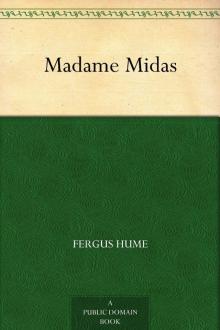 Madame Midas
Madame Midas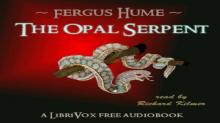 The Opal Serpent
The Opal Serpent The Solitary Farm
The Solitary Farm The Mystery Queen
The Mystery Queen The Bishop's Secret
The Bishop's Secret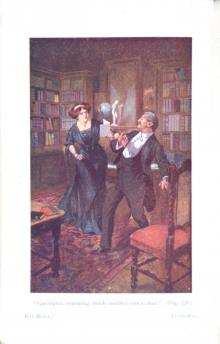 Red Money
Red Money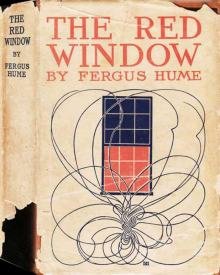 The Red Window
The Red Window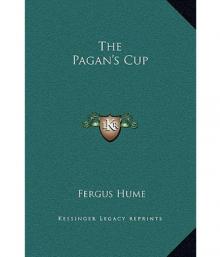 The Pagan's Cup
The Pagan's Cup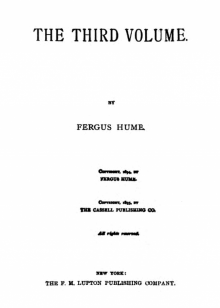 The Third Volume
The Third Volume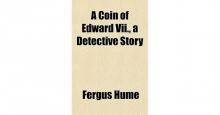 A Coin of Edward VII: A Detective Story
A Coin of Edward VII: A Detective Story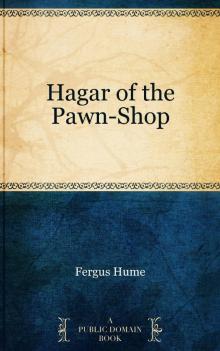 Hagar of the Pawn-Shop
Hagar of the Pawn-Shop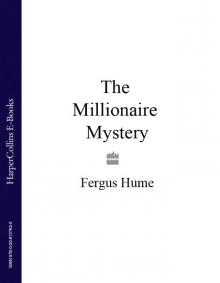 The Millionaire Mystery
The Millionaire Mystery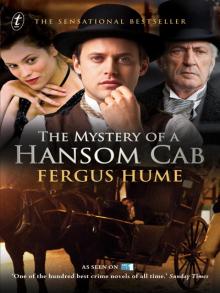 The Mystery of a Hansom Cab
The Mystery of a Hansom Cab